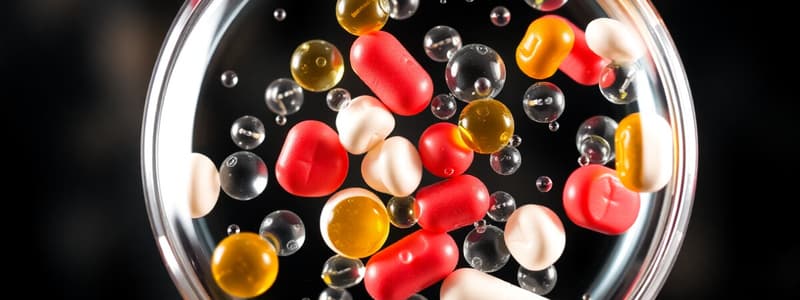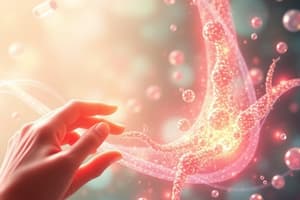Podcast
Questions and Answers
What does pharmacokinetics primarily examine?
What does pharmacokinetics primarily examine?
Which of the following is NOT a component of pharmacokinetics?
Which of the following is NOT a component of pharmacokinetics?
What is absorption in the context of pharmacokinetics?
What is absorption in the context of pharmacokinetics?
Which phase of pharmacokinetics is primarily responsible for altering drug concentration in the body?
Which phase of pharmacokinetics is primarily responsible for altering drug concentration in the body?
Signup and view all the answers
Which factor does pharmacokinetics determine?
Which factor does pharmacokinetics determine?
Signup and view all the answers
What is bioavailability in pharmacology?
What is bioavailability in pharmacology?
Signup and view all the answers
What does the route of drug administration affect?
What does the route of drug administration affect?
Signup and view all the answers
What organ is primarily involved in the metabolism of drugs?
What organ is primarily involved in the metabolism of drugs?
Signup and view all the answers
What is the main site of absorption for orally ingested drugs?
What is the main site of absorption for orally ingested drugs?
Signup and view all the answers
Which factor influences drug absorption by affecting the circulation to the site of administration?
Which factor influences drug absorption by affecting the circulation to the site of administration?
Signup and view all the answers
What effect does first pass metabolism have on a drug's bioavailability?
What effect does first pass metabolism have on a drug's bioavailability?
Signup and view all the answers
Which drug is typically administered by injection rather than orally due to its breakdown?
Which drug is typically administered by injection rather than orally due to its breakdown?
Signup and view all the answers
What is a significant disadvantage of intravenous drug administration?
What is a significant disadvantage of intravenous drug administration?
Signup and view all the answers
What is the primary characteristic of intramuscular administration compared to intravenous administration?
What is the primary characteristic of intramuscular administration compared to intravenous administration?
Signup and view all the answers
Why might a clinician choose a topical administration route over systemic absorption?
Why might a clinician choose a topical administration route over systemic absorption?
Signup and view all the answers
Which type of drugs are readily absorbed through unbroken skin?
Which type of drugs are readily absorbed through unbroken skin?
Signup and view all the answers
What is distribution in the context of pharmacology?
What is distribution in the context of pharmacology?
Signup and view all the answers
What characteristic of a drug enhances its absorption across membranes?
What characteristic of a drug enhances its absorption across membranes?
Signup and view all the answers
Which method results in the fastest drug administration?
Which method results in the fastest drug administration?
Signup and view all the answers
Which factor significantly affects the rate of drug absorption after intramuscular administration?
Which factor significantly affects the rate of drug absorption after intramuscular administration?
Signup and view all the answers
Which characteristic of the blood-brain barrier affects drug permeation?
Which characteristic of the blood-brain barrier affects drug permeation?
Signup and view all the answers
What is meant by the half-life of a drug?
What is meant by the half-life of a drug?
Signup and view all the answers
How does drug elimination primarily occur?
How does drug elimination primarily occur?
Signup and view all the answers
What determines the rate of termination of a drug's physiological response?
What determines the rate of termination of a drug's physiological response?
Signup and view all the answers
What best describes drug metabolism?
What best describes drug metabolism?
Signup and view all the answers
Which organ is primarily responsible for drug metabolism?
Which organ is primarily responsible for drug metabolism?
Signup and view all the answers
How does drug solubility affect excretion?
How does drug solubility affect excretion?
Signup and view all the answers
What role do cytochrome P450 enzymes play in drug metabolism?
What role do cytochrome P450 enzymes play in drug metabolism?
Signup and view all the answers
Which statement about drug excretion is accurate?
Which statement about drug excretion is accurate?
Signup and view all the answers
What is a significant effect of reduced renal function on drug elimination?
What is a significant effect of reduced renal function on drug elimination?
Signup and view all the answers
Which of the following is NOT a route of drug excretion?
Which of the following is NOT a route of drug excretion?
Signup and view all the answers
What is the result of drug metabolism?
What is the result of drug metabolism?
Signup and view all the answers
Flashcards
Pharmacokinetics
Pharmacokinetics
How the body processes a drug, including absorption, distribution, metabolism, and excretion.
Absorption
Absorption
The process of a drug moving from the administration site into the bloodstream.
Distribution
Distribution
The movement of a drug throughout the body.
Metabolism
Metabolism
Signup and view all the flashcards
Excretion
Excretion
Signup and view all the flashcards
Bioavailability
Bioavailability
Signup and view all the flashcards
Peak Concentration
Peak Concentration
Signup and view all the flashcards
Onset of Action
Onset of Action
Signup and view all the flashcards
Absorption (Drugs)
Absorption (Drugs)
Signup and view all the flashcards
Oral Absorption
Oral Absorption
Signup and view all the flashcards
First-Pass Metabolism
First-Pass Metabolism
Signup and view all the flashcards
Oral Cavity Absorption
Oral Cavity Absorption
Signup and view all the flashcards
Intravenous (IV) Administration
Intravenous (IV) Administration
Signup and view all the flashcards
Topical Effect
Topical Effect
Signup and view all the flashcards
GI Tract Absorption
GI Tract Absorption
Signup and view all the flashcards
Drug Half-Life
Drug Half-Life
Signup and view all the flashcards
Volume of Distribution
Volume of Distribution
Signup and view all the flashcards
Drug Clearance
Drug Clearance
Signup and view all the flashcards
Drug Metabolism
Drug Metabolism
Signup and view all the flashcards
Liver's role in drug metabolism
Liver's role in drug metabolism
Signup and view all the flashcards
Drug Excretion
Drug Excretion
Signup and view all the flashcards
Renal Clearance
Renal Clearance
Signup and view all the flashcards
Drug Solubility and Excretion
Drug Solubility and Excretion
Signup and view all the flashcards
Intramuscular (IM) administration
Intramuscular (IM) administration
Signup and view all the flashcards
Topical drug absorption
Topical drug absorption
Signup and view all the flashcards
Drug Distribution
Drug Distribution
Signup and view all the flashcards
Blood-Brain Barrier (BBB)
Blood-Brain Barrier (BBB)
Signup and view all the flashcards
Drug Elimination
Drug Elimination
Signup and view all the flashcards
Free drug
Free drug
Signup and view all the flashcards
Study Notes
Pharmacology for EMS - Week 4 Lecture 1: Principles of Pharmacology (ii)
- This lecture covers the principles of pharmacokinetics, common variables affecting drug absorption and distribution, the concept of drug bioavailability, and different drug administration routes and their effects.
Pharmacokinetics
- Pharmacokinetics is defined as "what the body does to the drug."
- It examines how a drug is altered during absorption, distribution, metabolism, and excretion.
- Pharmacokinetics involves absorption, distribution, metabolism, and excretion.
Drug Bioavailability
- The concept of drug bioavailability is described in week 4.
- Bioavailability refers to the proportion of an administered drug that reaches the systemic circulation.
Drug Administration Routes
- Different administration routes affect bioavailability, onset of action, peak plasma concentration, and duration of action.
- The lecture details various routes, comparing their effects on these pharmacokinetic parameters.
- The speed and effectiveness of different administration routes are discussed.
- Examples include intravenous, intramuscular, oral, and topical routes.
Variables Affecting Drug Absorption and Distribution
- Common variables affecting drug absorption and distribution are outlined.
- Factors impacting absorption and distribution are explained.
- The lecture notes discuss elements like the absorbing surface area, blood flow, drug solubility, ionization, and formulation.
Absorption
- Absorption is the process of an unchanged drug moving from the site of administration to the bloodstream.
- It's crucial for most drug administration methods (except IV).
- The route of drug administration impacts absorption.
- The factors that influence absorption are the nature of the absorbing surface, blood flow, drug solubility, ionization, and formulation of the drug.
Distribution
- Distribution is the reversible transfer of a drug between locations within the body.
- Drugs initially are primarily distributed to organs with good blood supply and slower to those with less.
- The presence of free drugs and drug-protein complexes, as well as lipid solubility, contribute to the distribution of a drug.
First Pass Metabolism
- The liver is the primary site of drug metabolism.
- Often, a significant portion of the absorbed drug undergoes metabolism before reaching the systemic circulation.
- First-pass metabolism reduces bioavailability.
- Factors influencing first pass metabolism are explored.
Elimination (Metabolism and Excretion)
- Elimination is the irreversible removal of a drug from the body through metabolism and excretion.
- Drugs are primarily metabolized by liver enzymes.
- Metabolites are often less active than the parent drug.
- Elimination routes, including urine, feces, sweat, expired air, and breast milk are mentioned.
Renal Clearance
- Kidneys are the major route for eliminating water-soluble drugs.
- Lipid-soluble drugs are poorly excreted by the kidneys.
- Reduced renal function affects excretion and elimination rates.
Topical Administration
- Topical administration primarily aims for localized effects.
- Lipid-soluble drugs are more easily absorbed through the skin.
- Transdermal patches are used for steady-state delivery.
Intravenous, Intramuscular Routes
- Intravenous administration is rapid, but invasive, while intramuscular is less invasive but slower-acting.
- Slower intramuscular absorption can result in safer plasma concentrations than intravenous.
- Local blood supply influences absorption rates for intramuscular injections.
Blood-Brain Barrier (BBB)
- The BBB prevents many drugs from crossing.
- Increased lipid solubility of drugs improves their ability to cross the BBB
- Certain conditions, e.g. inflammation, can affect the integrity of the BBB, allowing greater drug penetration.
Rate of Elimination
- The half-life of a drug is the timeframe for plasma concentration to decrease by 50%.
- Half-life is impacted by distribution volume and clearance rate.
- Dosing frequency considerations include half-life to avoid large fluctuations in plasma concentration.
Studying That Suits You
Use AI to generate personalized quizzes and flashcards to suit your learning preferences.
Related Documents
Description
Explore the foundations of pharmacokinetics in this lecture, focusing on drug absorption, distribution, metabolism, and excretion. Understand the concept of drug bioavailability and discover the various routes of drug administration and their effects on treatment outcomes.




